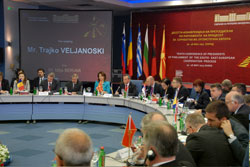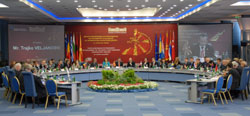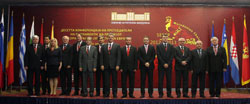Monday, 27 May 2013, Ohrid
Opening and introductory address of the President of the Assembly of the Republic of Macedonia Mr. Trajko Veljanoski at the 10th Conference of the SEECP Presidents of Parliament
 Distinguished colleagues, representatives of the Parliaments of the SEECP participating states,
Distinguished colleagues, representatives of the Parliaments of the SEECP participating states,
Dear guests, representatives of the international parliamentary assemblies,
Your Excellences,
Ladies and Gentlemen,
I have the special honour, on behalf of the Assembly of the Republic of Macedonia, to welcome you and to wish you a pleasant stay. It is a great pleasure for me to open this 10th Jubilee Conference of Presidents of Parliaments of the South-East European Cooperation Process participating states. What we started 16 years ago in Athens was an authentic and informal meeting on highest regional parliamentary level that gas grown into a continuous and mature process that has to be further developed and enter into a more advanced stage of our mutual cooperation.
I am especially pleased that at this Conference we have the presence of almost all the SEECP participating states that represented on different level - from Presidents and Deputy Presidents of Parliament to parliamentarians and national coordinators for parliamentary cooperation. These different levels of representation are because of reasons characteristic for the parliamentarians - some of the countries are in a very sensitive moment such as parliamentary elections, while other parliaments are in the middle of debate on crucial decisions that require quorum.
The interest and support for what we are jointly doing in order to achieve peace, security, stability, solidarity and good-neighbourly cooperation is being recognized on European level. Confirmation for this is the presence of the Acting President of the OSCE Parliamentary Assembly Mr. Wolfgang Grossruck, the Vice President of the European Parliament Mr. László Surján, and the Secretary General of the Regional Cooperation Council Mr. Goran Svilanović. We appreciate greatly the fact that they are here with us.
Allow me, as your host, to start our two-day debate with introductory remarks on the subjects of discussion at the Conference.
Regarding the second topic, it was opened at the 8th Conference in Antalya 2010, where we reached agreement to establish a Working Group that will propose the guidelines and modalities for the future development of the SEECP Parliamentary Dimension that will lead to the establishing of a Parliamentary Assembly. In the last two years the Working Group has held 10 meetings and discussed a package of draft documents that we will review this afternoon and that we will adopt probably during tomorrow’s session. The fact that the debate took several years resulted from the commitment to adopt the documents by consensus as a guarantee that they will not be of purely declarative nature, but that the agreed will be accepted and implemented by all of us jointly.
The first plenary session is dedicated to the new challenges as a result of the economic crisis and the role of the national parliaments in addressing the problems and challenges. The economic crisis has had a strong effect on our region and requires far-reaching and profound changes and reforms on national, regional and global level. In order to face the challenges in the field of economy, energy and climate change we must all adopt adequate solutions in accordance with our possibilities. However, we cannot overcome these challenges individually; we must find a common ground and approach them jointly on international and regional level. The crisis has shown that in a globally interconnected society, interlinked economies, and especially because of the interdependency of the countries in the region, we cannot successfully deal with the economic and financial problems individually. Practically, without implementation of the necessary changes and reforms the countries in the region will experience economic stagnation. The economic crisis is accompanied by challenges regarding climate change and energy that will affect the future generations. Consequently, we have to identify urgent and long-term measures for mitigation of the consequences of the crisis, especially on the vulnerable groups. The countries in the region are facing the enormous challenge of securing future economic development in the context of increased competition for the scarce resources by stimulating the green economy in order to deal with the climate change.
The most obvious consequence of the economic crisis is deterioration of the conditions for business, increased poverty and unemployment that especially affects young people. Fortunately, in the region we have countries that are well placed in the Doing Business reports of the World Bank; some are even listed among the emerging countries. This creates space for alleviation of the negative effects of the crisis with increased investments from the neighbourhood and improvement of the economic, transport and other communications and cross-border cooperation.
 The creation of favourable business and legal environment is one of the preconditions for economic recovery and growth in the region. In a time of prolonged economic crisis, the SEE parliaments should have a proactive role in the process of economic reforms. The legislative, oversight and control function of parliaments in the region is often under the influence of the executive - we must overcome this by strengthening the role and position of the parliament, which is of exceptional importance for strengthening of the democratic institutions. In order to have the role of a key institution in the political system, parliaments must be truly respected by all the actors in the political process, both domestically and internationally. Parliaments in the transitional and post-transitional societies need greater support from the public and the media, as well as greater respect from the relevant political parties in order to realize their crucial role in the democratic life of the countries with legitimacy. Only strong and respected parliaments can perform truthfully their control function over the executive and safeguard implementation of genuine and efficient economic and social reforms. Parliamentarians, as direct representatives of the people, have the duty to keep regular contacts with the electorate and transmit their requests and initiatives to the government or transpose them in legal solutions, especially in the field of economy.
The creation of favourable business and legal environment is one of the preconditions for economic recovery and growth in the region. In a time of prolonged economic crisis, the SEE parliaments should have a proactive role in the process of economic reforms. The legislative, oversight and control function of parliaments in the region is often under the influence of the executive - we must overcome this by strengthening the role and position of the parliament, which is of exceptional importance for strengthening of the democratic institutions. In order to have the role of a key institution in the political system, parliaments must be truly respected by all the actors in the political process, both domestically and internationally. Parliaments in the transitional and post-transitional societies need greater support from the public and the media, as well as greater respect from the relevant political parties in order to realize their crucial role in the democratic life of the countries with legitimacy. Only strong and respected parliaments can perform truthfully their control function over the executive and safeguard implementation of genuine and efficient economic and social reforms. Parliamentarians, as direct representatives of the people, have the duty to keep regular contacts with the electorate and transmit their requests and initiatives to the government or transpose them in legal solutions, especially in the field of economy.
There is no doubt that within the EU there is a relatively clear political consensus that Europe has responsibility towards the region and its integration in the EU. However, for the EU the enlargement is no longer its “grand project”. Enlargement is a long-term and strategic concept that cannot be evaluated on the bases of short-term results. For the SEE countries, joining the EU is still the only way forward that will secure stability and prosperity in the future, despite the fact that the surrounding countries are suffering from the impact of the global economic crisis. The national parliaments of the SEECP participating states should, with support of the European Parliament, undertake continuous efforts for keeping the momentum of the reforms and of the enlargement process. Maintaining the tempo of the reforms and enlargement actually represents both sides of the coin, and it is important for facing the key challenges of enlargement such as respect of the rule of law, resolving the bilateral issues, and addressing the economic problems. Final goal of the accession, candidate and spirant countries, as well as of the EU member states, is transformation of their economies into sustainable market economies, integrated in the common market.
Republic of Macedonia, as a transition country, has since its independence, especially since the beginning of the global economic crisis, has undertaken a series of measures for addressing the consequences and for improving of the social and economic situation. Regarding improvement of the business environment and attracting foreign investments, Macedonia has carried out comprehensive reforms that ranked her on the 6th place on the “Doing Business” list of countries when it comes to opening new businesses, which makes it a leader in the region of SEE. The latest IMF mission assessed that the Republic of Macedonia is a country with stable economy and macroeconomic performances, despite the difficult conditions and surrounding.
The economic model that the Republic of Macedonia is pursing is successful in minimizing the negative effects on our economy as a result of the economic crisis. The economic and monetary indicators for 2013 are positive, and we are expecting even better results for the second half of the year. This is also the assessment of the business community. General conclusion is that the financial sector in Macedonia is stable, despite all the instability and insecurity that is hurting the global economy and the financial markets in the world. There are no systemic risks. The banks and the other segments of the financial market are successfully facing the current challenges generated by the European and global crisis.
 Sustained economic growth and improved competitiveness on long-term basis continue to the strategic priorities of the Republic of Macedonia, as well as better standard of living and quality of life, reducing the unemployment rate... This will be achieved with creation of a better business climate, maintaining the macroeconomic stability, implementation of fiscal policies for support of the economic growth, increased foreign and domestic investments, implementation of active employment policies in order to improve the knowledge and qualifications of the people on the labour market; safe, secure and high-quality supply of energy for the consumers, use of renewable sources of energy, and increased energy efficiency.
Sustained economic growth and improved competitiveness on long-term basis continue to the strategic priorities of the Republic of Macedonia, as well as better standard of living and quality of life, reducing the unemployment rate... This will be achieved with creation of a better business climate, maintaining the macroeconomic stability, implementation of fiscal policies for support of the economic growth, increased foreign and domestic investments, implementation of active employment policies in order to improve the knowledge and qualifications of the people on the labour market; safe, secure and high-quality supply of energy for the consumers, use of renewable sources of energy, and increased energy efficiency.
The government programmes for the forthcoming period envisage various initiatives and projects for future development of a functional market economy, favourable and attractive business climate, encouraging competitiveness based on knowledge and innovation, as well as creation of economic conditions for implementation of the reforms necessary for integration of the country in the EU and NATO. With the aim of improving the business climate, the government policies and measures are focused on continuation of the regulatory reforms for simplification of the procedures for doing business, strengthening of the dialogue with the business community, and reducing the costs and procedures.
The national parliaments have an important role in all these processes. They should be active controllers of the consistency of the government on the path of reforms aimed at coming out of the crisis and in the implementation of the general policies and measures. They should also be active participants in the completion of this process. I would only like to add that the mutual cooperation between the national parliaments in facing all the global and regional economic challenges, having in mind their nature of interconnection, is necessary and more than welcome.
Thank you.